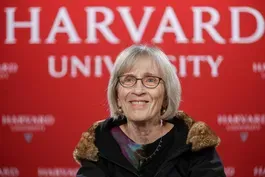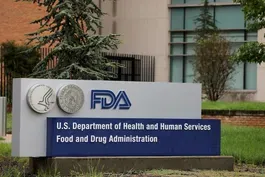
What to know about Venezuela and Guyana’s territory dispute
Clip: 12/9/2023 | 7m 28sVideo has Closed Captions
What to know about escalations in Venezuela and Guyana’s territorial dispute
Tensions are rising in South America as Venezuela threatens to take over a large region of Guyana that’s rich in resources. Venezuela on Saturday signaled openness to “high-level” talks to resolve the standoff, but Guyana has yet to respond. Ali Rogin speaks with Carolina Jiménez Sandoval, president of the Washington Office on Latin America, about the dispute’s history and latest developments.
Problems with Closed Captions? Closed Captioning Feedback
Problems with Closed Captions? Closed Captioning Feedback
Major corporate funding for the PBS News Hour is provided by BDO, BNSF, Consumer Cellular, American Cruise Lines, and Raymond James. Funding for the PBS NewsHour Weekend is provided by...

What to know about Venezuela and Guyana’s territory dispute
Clip: 12/9/2023 | 7m 28sVideo has Closed Captions
Tensions are rising in South America as Venezuela threatens to take over a large region of Guyana that’s rich in resources. Venezuela on Saturday signaled openness to “high-level” talks to resolve the standoff, but Guyana has yet to respond. Ali Rogin speaks with Carolina Jiménez Sandoval, president of the Washington Office on Latin America, about the dispute’s history and latest developments.
Problems with Closed Captions? Closed Captioning Feedback
How to Watch PBS News Hour
PBS News Hour is available to stream on pbs.org and the free PBS App, available on iPhone, Apple TV, Android TV, Android smartphones, Amazon Fire TV, Amazon Fire Tablet, Roku, Samsung Smart TV, and Vizio.
Providing Support for PBS.org
Learn Moreabout PBS online sponsorshipJOHN YANG: Tensions between South American neighbors Venezuela and Guyana escalated this week over a century old territorial dispute.
Today, Venezuela signaled openness to high level talks to resolve the standoff, but Guyana has yet to respond.
Ali Rogan has more.
ALI ROGIN: Last week, Venezuelan President Nicolas Maduro held a referendum to declared sovereignty over a resource rich region that makes up two-thirds of Guyana's territory.
Maduro pledged to begin oil and mining exploration immediately.
PRESIDENT NICOLAS MADURO, Venezuela (through translator): Let's see where on the map here celebrate tonight.
long lived a complete map of Venezuela.
Long live the Homeland.
Long live all of Venezuela.
ALI ROGIN: Both countries have claimed ownership of the Essequibo region since its borders were decided in favor of Guyana over a century ago when Guyana was still a British colony.
But the discovery in recent years of 11 billion barrels worth of oil and gas off Guyana's Coast gave new life to the dispute.
New oil drilling is driving huge gains in Guyana as economy as Venezuela's economy flounders despite its own massive reserves.
Carolina Jimenez Sandoval is president of the Washington Office on Latin America, a research organization that advocates for human rights in Latin America.
Carolina, thank you so much for joining us.
Can you tell us a little bit more about the importance that Essequibo has played in recent years and decades in terms of the culture of both of these countries?
CAROLINA JIMENEZ SANDOVAL, Washington Office On Latin America: I think for Venezuela, this is an old sentry issue.
Most Venezuelans who grew up and, you know, believing strongly reinforcing the idea that the Essequibo is part of Venezuela, but that it is a territory in dispute.
And then, you know, as children in schoolbooks, people used to draw the Essequibo region with dotted lines saying, you know, territory to be claimed.
For Guyana, its territory.
I mean, it comprises two thirds of the current Guyana's as a country territory.
So I think it is indeed, you know, a very complex country when you have a country that lives there that occupies the territory effectively, and another one claiming its historical rights to the land.
ALI ROGIN: And why is Maduro taking these steps at this time?
CAROLINA JIMENEZ SANDOVAL: I think there are two things that are important to understand when one see the current conflict.
One is oil.
That's a huge reserve.
And it's a very important as we know products for the world even today.
But the second and I think it's really important to think about this is internal Venezuelan politics.
Maduro is a deeply unpopular leader.
And he's also deeply authoritarian enter he faces presidential elections in 2024.
At the end of October, the opposition for the first time in years, self-organized primary elections to choose one candidate who could run against Maduro in 2024.
It seems the Maduro government underestimated this citizen exercise because he was self-managed.
The National Electoral Authority didn't play any role.
Over 2.3 million people voted, including people in different cities around the world because the diaspora had a chance to participate.
And the support went overwhelmingly to one candidate Maria Corina Machado, the government seems to have been taken by surprise.
As a result, we see a tremendous propaganda apparatus set in place to then change the narrative and, you know, take all the attention away from that issue and make everyone speak about a territorial dispute that is, over a century years old.
ALI ROGIN: And how is this playing out with the average Venezuelan?
What are they thinking of this?
And how do they view Nicolas Maduro in this context?
CAROLINA JIMENEZ SANDOVAL: When you look at the at the referendum itself, what you notice is that, although Maduro claimed that 10.4 million people went to vote, independent media and citizens and self-reporting, reported a very low turnout, but I think his lack of popularity really chose her on this.
And I think Venezuela was want a peaceful transition to democracy because it's, you know, for many years human rights violations has been at the forefront of his leadership.
ALI ROGIN: How is Guyana responding?
CAROLINA JIMENEZ SANDOVAL: For Guyana, this is an existential threat, right?
I mean, Maduro is claiming, you know, two-thirds of their territory and I think the president of Guyana has been very clear about first of all defending their country but they have also, I mean the government has also be very strategic rally support from its allies.
The U.S. government has very clearly said that he supports Guyana.
I think the Guyanese government has also gone to the U.N. Security Council has tried to rally support among Caribbean countries.
So it's -- it seems that the strategy is to get as much international support as possible to avoid escalation of the crisis.
ALI ROGIN: And how big is the risk of escalation here, there have been troop movements that have taken place as a result.
But what is the possibility that this turns into some sort of a confrontation?
CAROLINA JIMENEZ SANDOVAL: Maduro's nationalistic rhetoric seems to, you know, promote the idea that the government is willing to go to the very end, whatever the consequences to reclaim this territory, but the reality that it is -- that Maduro salaries will not support, you know, any further escalation of the conflict.
And that and I don't think, you know, any leader in the region, or even the U.S. wants another war in the world, and certainly a war in South America.
So, despite its loud narrative about going all the way, I think there will be a lot of international resistance.
ALI ROGIN: And in terms of the United States response, they've come out squarely behind Guyana, but at the same time, the United States lifted sanctions, oil sanctions on Venezuela earlier this year in exchange for some electoral concessions in the upcoming election, allowing opposition candidates to stand at least that was the agreement, if not in, in practice, how does this affect that situation with the United States?
CAROLINA JIMENEZ SANDOVAL: I think Maduro keeps putting the U.S. calm into a major dilemma, to continue supporting negotiations between the democratic opposition and the government, to continue supporting the agreements signed in Barbados.
And at the same time, you know, to react to Maduros actions around the Essequibo and to demand that it fulfills agreements because so far the U.S. indeed, lift the sanctions, but Maduro hasn't done his part.
He hasn't released the political prisoners that are Americans or political prisoners.
He still hasn't given proper electoral guarantees for the elections in 2024.
But I think the best thing the U.S. can do is to continue supporting the negotiation process between the opposition and the Maduro government supporting human rights and, you know, for Venezuelans inside the country and outside of the country, and to oppose any further escalation of this crisis.
ALI ROGIN: Carolina Jimenez Sandoval with the Washington office on Latin America.
Thank you so much for your time.
CAROLINA JIMENEZ SANDOVAL: Thank you.
Nobel laureate Claudia Goldin on women in the workforce
Video has Closed Captions
Clip: 12/9/2023 | 7m 33s | Nobel laureate Claudia Goldin’s takeaways from her research on women and work (7m 33s)
Why FDA approval of sickle cell gene therapy is a ‘big deal’
Video has Closed Captions
Clip: 12/9/2023 | 5m 8s | Why the FDA’s approval of revolutionary sickle cell gene therapy is a ‘big deal’ (5m 8s)
Providing Support for PBS.org
Learn Moreabout PBS online sponsorshipSupport for PBS provided by:
Major corporate funding for the PBS News Hour is provided by BDO, BNSF, Consumer Cellular, American Cruise Lines, and Raymond James. Funding for the PBS NewsHour Weekend is provided by...













